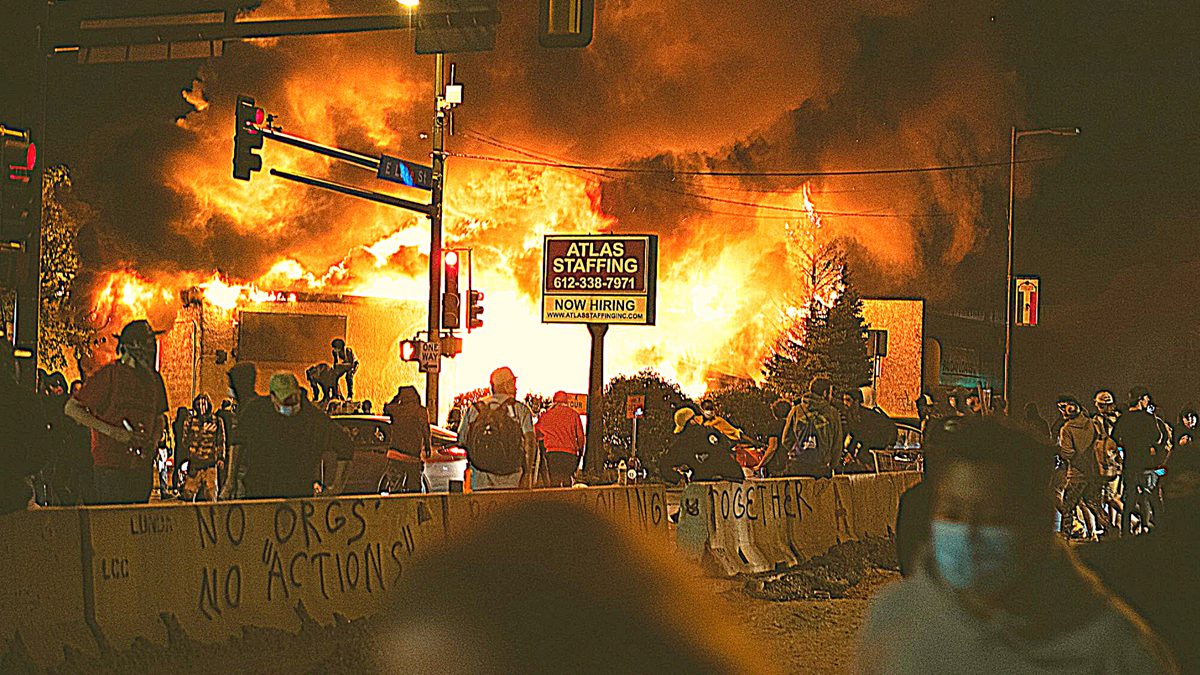On August 23, the police shooting of an African American man named Jacob Blake sparked national unrest yet again, in a pattern that has become all too common. Blake survived the shooting, and the incident was murky—not a clear-cut injustice. Yet rioting and looting broke out in Kenosha, Wisconsin, nonetheless.
Now, as the dust settles and locals begin to sort through the rubble, the scale of the destruction that rocked the city after Blake’s shooting is becoming clear.
At least 56 businesses were damaged or destroyed by looting or arson, according to the Wall Street Journal. Current assessments report more than $50 million in damage.
“The destruction has left shop owners in one of Kenosha’s oldest business districts grappling with why their businesses became casualties of the destruction that has followed protests against racism and police brutality, and whether they will have the money to rebuild and stay in the neighborhood,” the Journal reports. “While Kenosha’s population is 79.5% white and 11.5% Black, according to census data, locals say the Uptown neighborhood is one of the city’s most diverse areas, with a majority of minority-owned businesses.”
You can take a look at the pictures I took during the riots in Kenosha last week on my Instagram: https://t.co/4HpVYRup8K
— Julio Rosas (@Julio_Rosas11) September 1, 2020
Here are some examples. pic.twitter.com/47AOBGpVfN
It appears that in Kenosha, just as in Minneapolis and Chicago, the fallout from rioting and looting will disproportionately harm minority communities.
“I always think that people have the right to protest—to peacefully protest—but this goes beyond that,” La Estrella Supermarket owner Abel Alejo said. “They were destroying the neighborhoods that they want to protect.”
Even a local Black Lives Matter leader denounced this destruction, saying “We’re not into doing anything to damage our community... it waters down our message.”
This used car dealership in Kenosha that had dozens of cars completely burned out during riots last week now has signs posted asking “Where is our justice?” & “What did our community do to deserve this?” Another says “Help needed” and directs ppl to a GoFundMe page. pic.twitter.com/FBPmQHuM0S
— Garrett Tenney (@Garrett_FoxNews) September 3, 2020
This damage is significant, but defenders will no doubt seek to downplay it, explaining that “businesses have insurance.” Yet the damage goes beyond cold cash. There is also the enormous human and emotional toll involved in having your property destroyed and having to pick up the pieces that even a premium insurance plan can’t account for. What’s more, lost income and unpaid labor inevitably await any entrepreneur victimized by vandalism.
Plus, many small businesses don’t have insurance or are underinsured. They will have to bear the costs themselves.
Ultimately, the destruction in Kenosha and its disproportionate impact on urban, minority communities reminds us of a timeless lesson: Property rights are the fundamental basis of a market economy. Yet, despite how critics often portray them, property rights are not simply a matter of protecting the wealthy and big corporations. The protection of private property is what ensures immigrants, minorities, and poor people are not derailed on their climb up the economic ladder in pursuit of the American dream.
These Danish brotherhood lodge members are going through the rubble by hand looking for all their photo albums. The business was destroyed in the #KenoshaProtests pic.twitter.com/KSHMyT3IBu
— Mike De Sisti (@mdesisti) September 1, 2020
Moreover, the protection of property rights uplifts everyone by setting the stage for long-term economic success that benefits all. It is the engine of our prosperity and is integral to freedom.
Nobel laureate economist and philosopher Friedrich Hayek once wrote that, “The system of private property is the most important guarantee of freedom, not only for those who own property, but scarcely less for those who do not.” Similarly, the economist Thomas Sowell has said that property rights, “belong legally to individuals, but their real function is social, to benefit vast numbers of people who do not themselves exercise these rights.”
What this means is quite simple: Callous disregard of property rights creates long-term instability that scares away business investment and reduces economic opportunity. Often, this manifests itself in the form of lower property values, higher insurance rates passed on to consumers, reduced tax revenue, and fewer jobs in an area.
You don’t have to just take my word for it. Studies examining the long-term economic impact of the 1960s Civil Rights Era riots and the 1990s Los Angeles Rodney King riots document these exact effects.
So, when looters descend on urban communities like Kenosha in a wave of destruction, even liberal supporters of criminal justice reform shouldn’t fall for the narrative that rioting is harmless, justified, or helpful. The evidence is clear. “Social justice” agitators who cross the line past peaceful protest and engage in violent vandalism are only sabotaging the same minority communities they claim to care about.

